What Do Brits Want? 5 Takeaways from A New UK Consumer Survey on Plant-Based Meat
6 Mins Read
A new survey of 1,000 UK consumers highlights the importance of taste, price and more information when it comes to plant-based meat. Here are five key takeaways from the poll.
Published earlier this week, the research – conducted by insights firm Bryant Research, alt-protein advocacy organisation ProVeg International and plant-based consultant Plant Futures – polled 1,000 UK consumers on their attitudes towards plant-based meat.
Despite being Europe’s second-largest vegan market – with Brits spending £964M on plant-based meat and dairy last year – sales have declined by 3% between 2021-22 in the UK, with meat alternative sales sliding by 8% in the same period, according to the Good Food Institute Europe.
How can brands cater better to what the country’s consumers want from their food? Here are five key takeaways from the research, titled ‘What we know about UK plant-based meat consumers:
A similar number of people have increased and reduced plant-based meat consumption
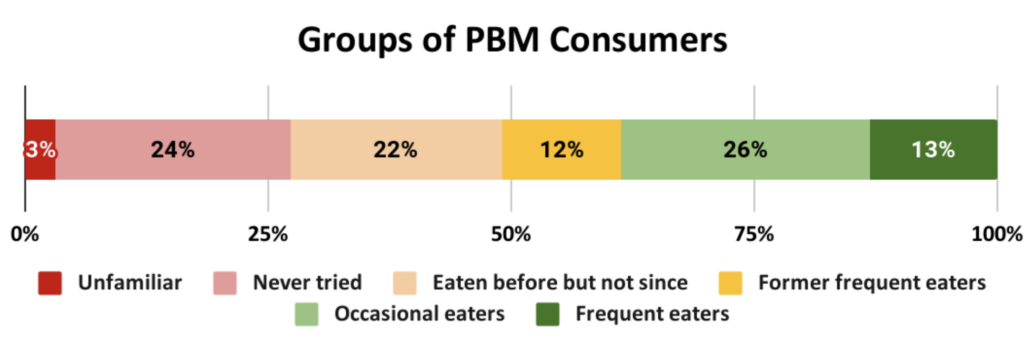
While the number of people who have tried vegan meat increased from 53% in 2021 to 73% in 2023, there’s an almost even split in the number of people who eat these products frequently (39%), and those whose consumption has ‘lapsed’ (34%) – i.e. reduced or eliminated.
The report also found that only 1% of Brits identify as vegan with 3% calling themselves pescatarian and 6% vegetarian. Almost a quarter (23%) said they follow a flexitarian diet. Among flexitarians and pescetarians, 43% frequently consume plant-based meat, while omnivores make up the largest group of consumers who were former frequent eaters (57%).
Taste and price are the biggest complaints about plant-based meat
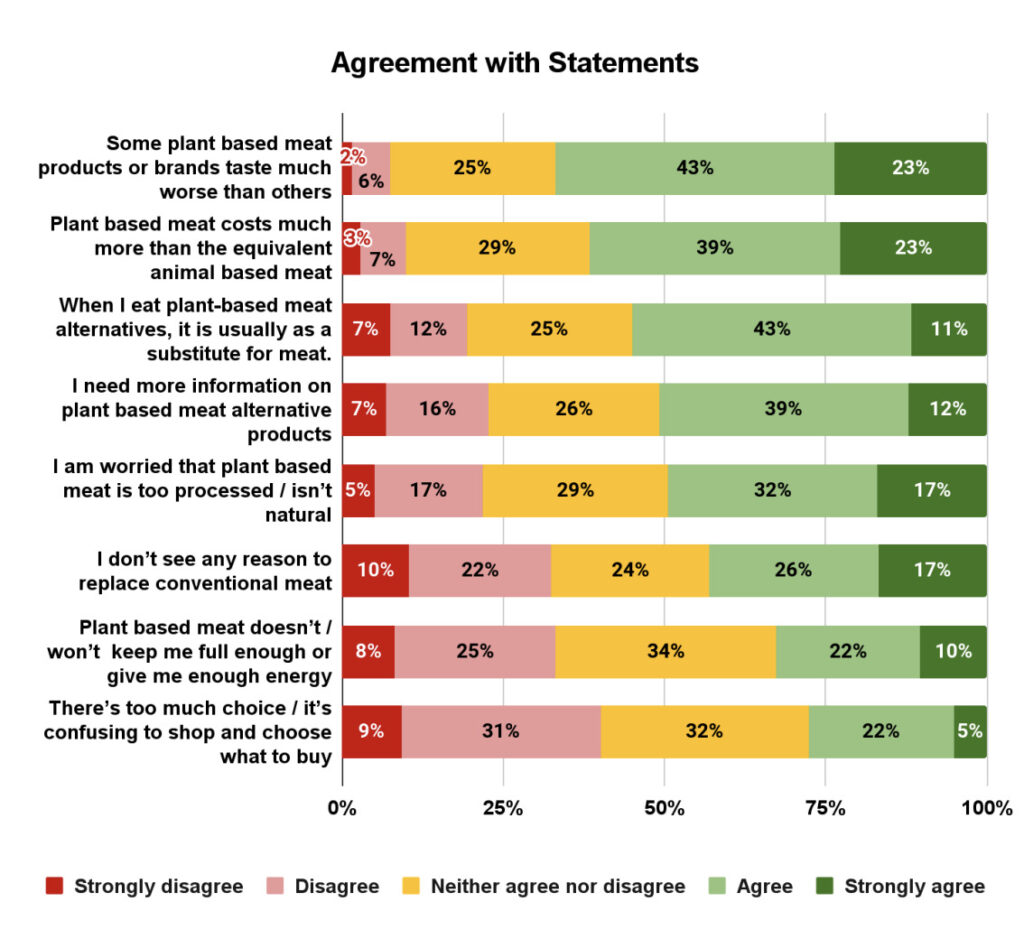
Taste and price are the major drivers behind why people don’t eat plant-based meat. The pollsters provided the respondents with multiple statements to see what most people agreed with. Almost two-thirds (66%) of people concurred that some meat alternatives taste much worse than their conventional counterparts, and 62% agreed the former cost much more.
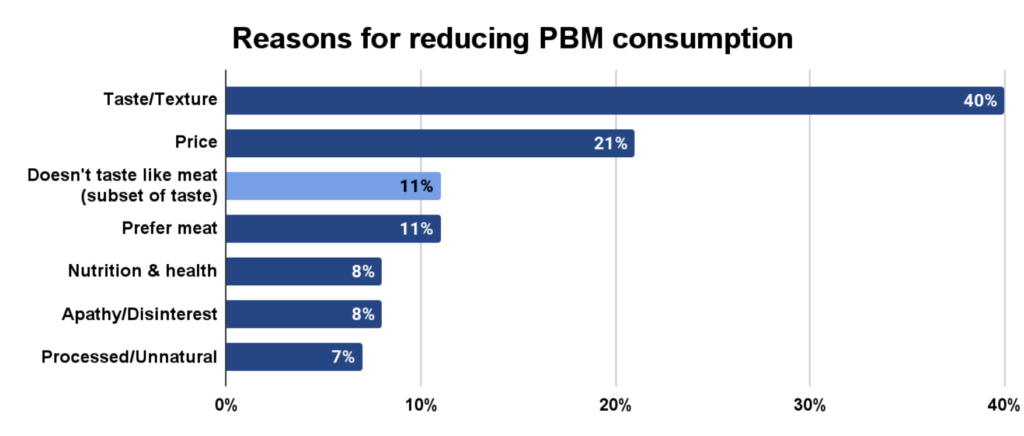
Occasional vegan meat eaters and lapsed consumers were the demographics most likely to cite these concerns. Meanwhile, 51% of respondents say taste/texture is the biggest reason for their reduction of plant-based meat consumption, while 21% cite price. On the other hand, taste and texture are the second-biggest factors for people choosing to eat these products, with 36% quoting these elements.
Consumers are divided on the health aspects of plant-based meat
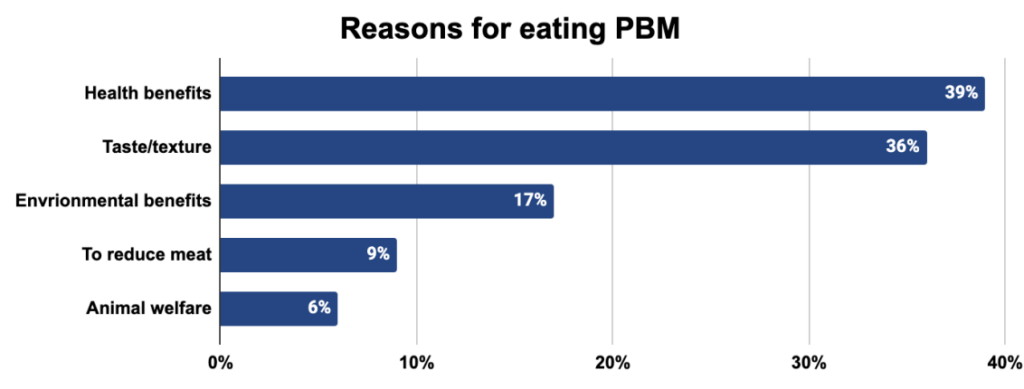
Health has been the primary focus for plant-based meat brands recently. The health benefits are the number one reason why people in the UK say they eat plant-based meat, being key for 39% of respondents. And 49% of consumers agree with the statement that these products are too processed or unnatural – something that has been a bane of this industry.
However, in open-text questions, only 8% of consumers reducing their consumption said they do so out of concern about nutrition and health, with just 7% saying the same for their processed nature.
Brits want more information about vegan meat alternatives
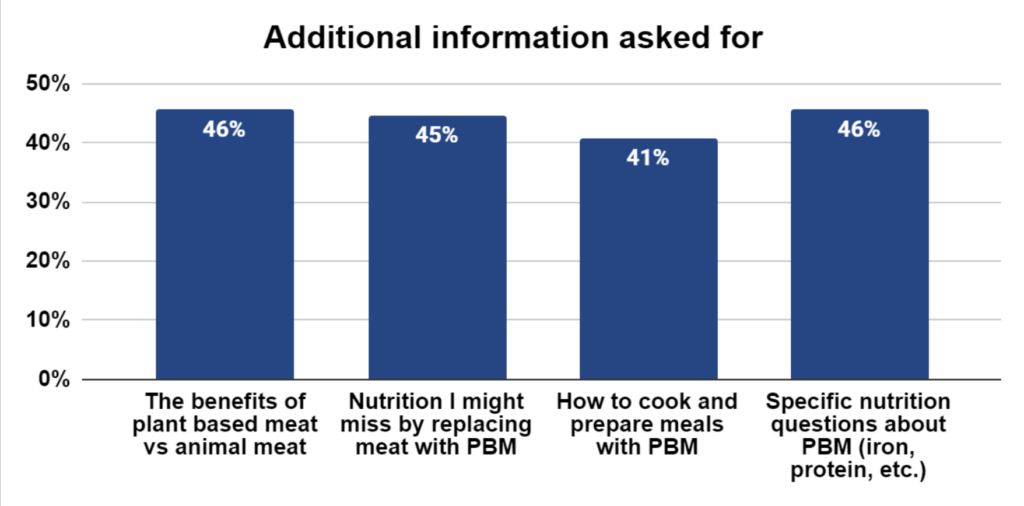
In the statement section, 43% of consumers agreed that they don’t see any reason to replace conventional meat – despite heaps of evidence pointing to the contrary. Replacing half of our meat and dairy consumption with plant-based alternatives can double climate benefits, while another study has found that vegan diets can reduce emissions, land use and water pollution by 75% compared to meat-rich diets.
Consumer awareness is key – and so is increased education. Over half (51%) of respondents said they’d like more information on meat alternatives, with occasional and former frequent eaters most likely to want more details. Nutrition was a key aspect, with 46% (and over 35% of those unfamiliar with these products) asking for more information about specific nutritional aspects like iron, protein, etc.
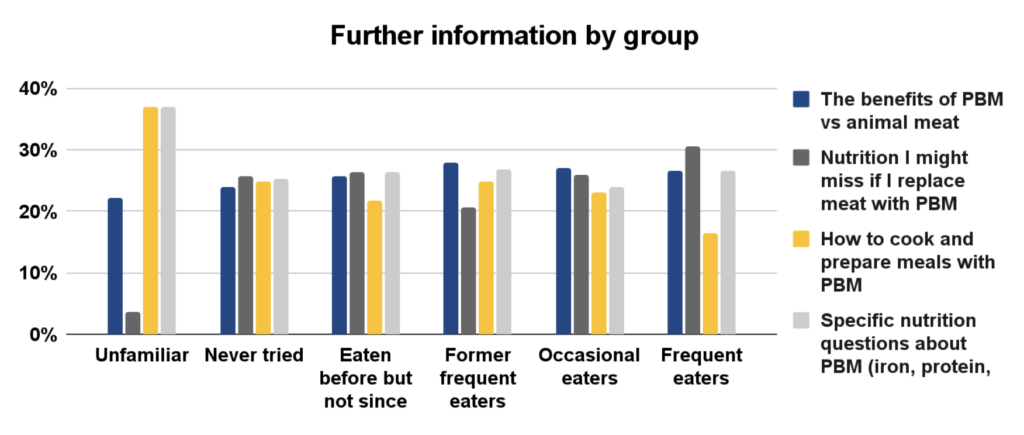
Questions about the nutrition they might be lacking if they switch to plant-based meat, the benefits of vegan vs conventional meat, and how to cook these products were also concerns cited. Interestingly, consumers most disagreed with the assertion that there is too much choice when it came to these products, with only 27% saying there are too many options.
The price perception gap needs to be closed

Speaking of information and awareness, nearly two in five respondents (39%) surprisingly believe plant-based meat products cost the same as their animal-derived counterparts. This is despite a 2022 study by consumer platform Which? revealing that most vegan sausages and burgers at leading UK supermarkets cost more than conventional products – though some SKUs at Sainsbury’s are equal or cheaper in price.
The markups of some vegan sausages were, in fact, twice as high. In this latest survey, 22% of UK consumers believed plant-based meat costs between 10-20% more, and 31% believed they’re 20-50% more expensive.
Additionally, people who used to eat meat alternatives frequently have similar perceptions of the price gap between plant-based and conventional meat to those who have eaten vegan products before but never since, and those unfamiliar with them. This indicates that former consumers of plant-based meat are particularly concerned about the cost of these products – it chimes with research earlier this year that found feeding a family of four with three vegan alternatives a week could cost £115.44 more in the UK annually.
Recommendations for UK plant-based meat brands
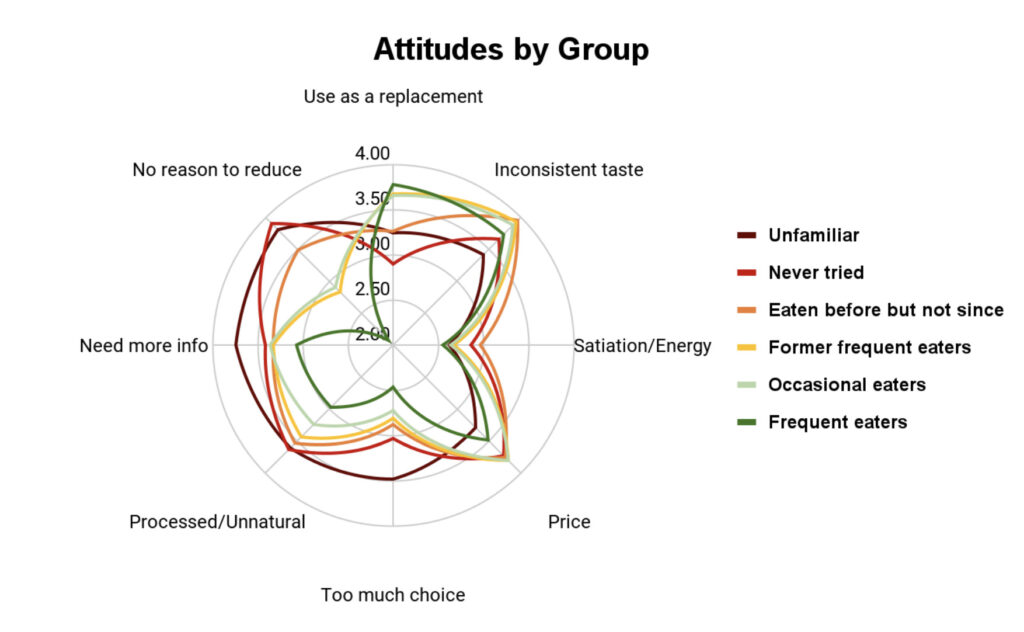
The study made three key recommendations for plant-based meat brands to better cater to UK consumers. The first centres on taste and price improvements: the authors expect product prices to fall as demand for meat alternatives grows in the long term, but in the current landscape, price promotions could entice a lot of customers. And when product quality is improved, the results should be widely shared and showcased through free in-store samples.
Winning the health argument is the second suggestion. While some have concerns about the nutrition and processed nature of these products, many who consume plant-based meat regard health benefits as a big plus. Brands are urged to bust the narrative that all processed foods are unhealthy and promote the nutritional superiority of vegan meats in terms of their low saturated fat, zero cholesterol and increased fibre.
Finally, awareness about the need to change must be increased. Many people still don’t see a need to replace their consumption of animal products, especially those who have never tried vegan alternatives. The plant-based sector is urged to hone in on the environmental, animal welfare and health aspects of these products while continuing to improve their pull with better flavour and lower prices.
“This research underscores the important factors for plant-based meat companies to improve in order to get the market back to healthy growth,” said lead researcher Chris Bryant. “Producers need to continue driving taste and quality up, and driving price down – these factors emerged as the biggest concerns for consumers who have lapsed in this category.”
ProVeg International CEO Jasmijn de Boo added: “We know people are curious, but companies and retailers can help make the plant-based sector more appealing and help shape the future of food.”



